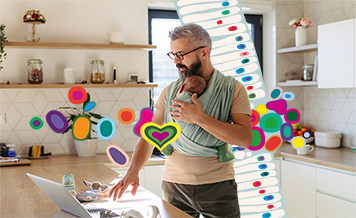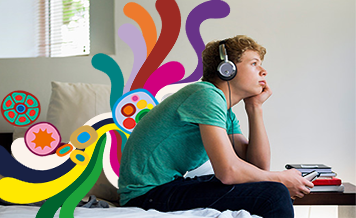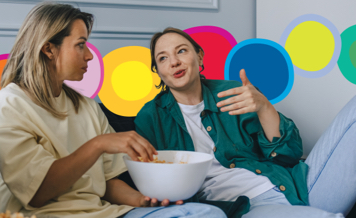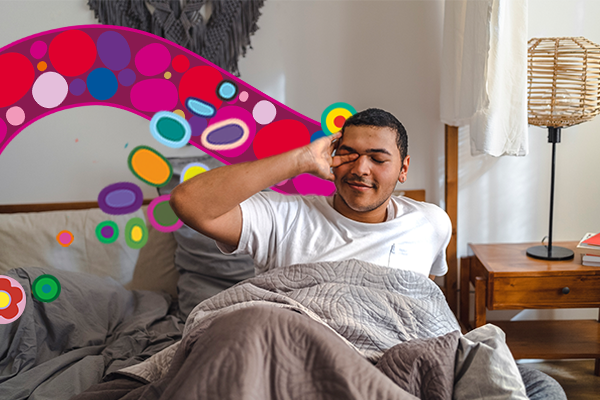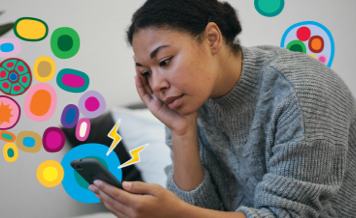Could you be stuck in a negative thought loop?

Sadness, negativity, anxiety; these feelings are just as much a part of life as feelings of happiness, excitement and positivity. Whilst they aren’t pleasant, negative emotions can be helpful. They can help us process difficult situations, take stock of our behaviours and act as useful alerts that something might not be right.
However, in some cases negative thoughts can start to outweigh positive emotions, or you can become stuck in a negative thought ‘loop’. Negative thought patterns can also accompany other mental health conditions, like depression and anxiety or other disorders such as social phobia, obsessive compulsive disorder or post traumatic stress disorder can cause a negative thinking pattern that becomes automatic. This can make it hard to judge when your thoughts are rational or if you’re being unkind to yourself.
Sarah Kewming, an accredited mental health and family violence social worker and therapist says that negative thinking can manifest in different ways. Some examples include:
Black and white thinking: “this is pretty much what it sounds like,” says Sarah. “It’s when people are unable to see any grey areas in a situation and will view it as wholly negative or one sided.”
Over generalisation: “this can manifest as catastrophising problems, feeling like something is the end of the world where to another person it wouldn’t seem that bad,” says Sarah.
Jumping to conclusions: “we call this mind reading” says Sarah. “People who are suffering from this kind of thinking will often believe they know what people are thinking about them even when that is proven not to be true.”
Fortune telling: “we will sometimes see patients who are so convinced that they know what is going to happen that they’ll base all their behaviours around that perceived outcome,” says Sarah.
Magnification and catastrophising: “this can manifest itself as overreactions to small problems or a spiralling of negative thoughts,” says Sarah. “It could start as spilling something on a carpet and instead of just cleaning it up, the person might start to believe that the entire carpet is contaminated by the spill and that this will go on to make them sick, which leads to anxiety and panic.”
Emotional reasoning: “we often see this with people coming up with ways to justify why they are thinking in an irrational way,” says Sarah. “Coming up with reasons why you are sad and being unable to change that narrative or challenge that way of thinking can be a sign that it’s time to seek help.”
How to deal with negative thought patterns
Recognising you are experiencing a negative thought pattern or loop can be difficult – it can be hard to see the wood through the trees, as they say. But once you recognise a negative thought pattern, there are some things you can try to change your thinking.
Try mindfulness
Mindfulness is the practice of being in the moment. And it can help you focus on what’s happening, rather than on the negative thoughts racing through your head. It can also help you recognise negative thoughts as ‘thoughts’ rather than reality.
It doesn’t have to be meditation – it can be focusing on the sensations and sounds as you take a walk in nature, or relishing every mouthful of your morning coffee.
Challenge your thoughts
If you have recognised a negative thought pattern, challenging it can help. Asking yourself are these thoughts actually true? Is there something else going on my life that is making me think this way? It can also help to think about what you would say to someone else experiencing these thoughts. Try to treat yourself with the same kindness and patience as you would a good friend.
Speak with a professional
There are many different options for treating negative thought patterns. Talking therapies like Cognitive Behavioural Therapy are some of the most common.
“We often see people who are profoundly depressed, anxious or have very repetitive behaviours that start to realise that this doesn’t have to be their narrative,” says Sarah. “When people see how capable they are and that they can achieve the goals we set in therapy you see an amazing shift in what they are able to do and how they think about themselves.”
If you’re interested in using talking therapies, you should consider seeing a mental health professional who specialises in these, for example a psychologist, or mental health social worker.

24/7 Medibank Mental Health Support
Medibank health insurance members can chat to a mental health professional about how they feel and ask questions about a range of mental health concerns for themselves or a loved one and get guidance on what they can do next. Chat online or call 1800 644 325 anytime of the day or night, 7 days a week at no extra cost.~
When do negative thought patterns become an issue?
We all experience negative thoughts, or negative thought patterns from time-to-time. It’s when they begin to affect your life that they become a problem; for example, you may be having trouble sleeping, connecting with friends and loved ones, or you find you no longer enjoy the things you used to.
It’s also not uncommon for negative thought patterns to accompany other mental health issues, like anxiety or depression.
Where to get help
If your life or someone else’s is in danger, call 000 immediately.
If you’re in distress and need help, call Lifeline on 13 11 14 for 24/7 crisis support.
For non-emergency support, your GP or regular health practitioner is often the best place to start. They will be able to assess your individual situation and recommend the best next steps for your recovery.
Medibank health insurance members can chat to a mental health professional about how they feel and ask questions about a range of mental health concerns for themselves or a loved one and get guidance on what they can do next. Chat online or call 1800 644 325 anytime of the day or night, 7 days a week at no extra cost~.
Remember that help is always available, no matter the situation.
How can we help?
I want to know how my cover supports mental health
I need help and want to talk
Related articles
Things you need to know
~Some referred services may involve out of pocket costs and waiting periods may apply.
While we hope you find this information helpful, please note that it is general in nature. It is not health advice, and is not tailored to meet your individual health needs. You should always consult a trusted health professional before making decisions about your health care. While we have prepared the information carefully, we can’t guarantee that it is accurate, complete or up-to-date. And while we may mention goods or services provided by others, we aren’t specifically endorsing them and can’t accept responsibility for them. For these reasons we are unable to accept responsibility for any loss that may be sustained from acting on this information (subject to applicable consumer guarantees).


